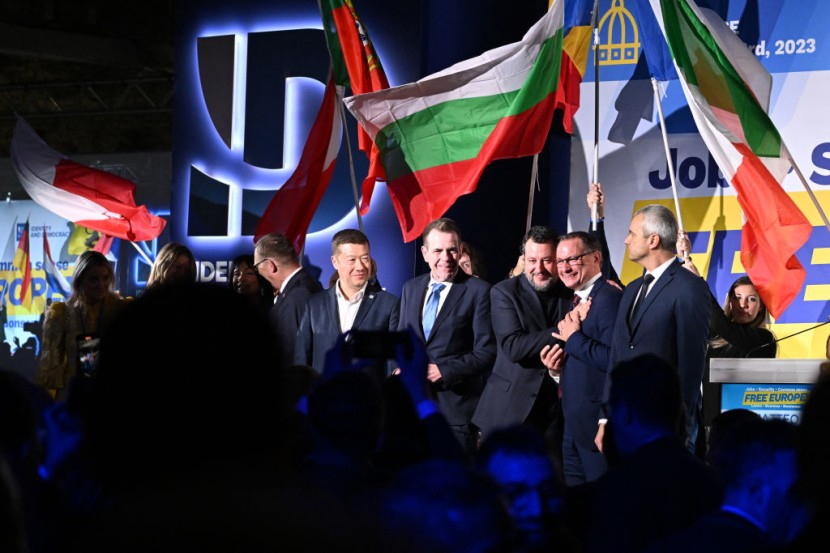Europe's right-wing leaders, representing the Identity and Democracy (ID) group, rallied in Florence on Sunday, marking the start of their EU-wide election campaign.
This follows the unexpected victory of the Netherlands' anti-Islam leader, Geert Wilders, in November's general elections. The ID's Euroskeptic members, addressing approximately 2,000 supporters at a 16th-century fortress, pledged to transform the political landscape in Brussels, as per Politico.
Salvini Urges EU Center-Right Alliance to 'Liberate Brussels'

Matteo Salvini, Italy's far-right League leader, urged the European People's Party (EPP) to collaborate and "liberate Brussels" from what he termed as illegal occupiers. Salvini, a key figure in Italy's coalition government, advocated for unity among center-right factions in the EU, highlighting the success of such an approach in Italy.
In Florence, Salvini hailed the gathering as a "historic day," suggesting a "Renaissance of Europe" based on work and rights, presenting a stark choice between freedom and fear, rights and extremism. He emphasized the importance of a united center-right force to free Brussels from illegal occupation.
Despite the League's success in 2019, it has since seen a decline in support, with Meloni's Brothers of Italy party rising to 29%, while the League stabilizes at 9.3%. The League aims to capture votes from Forza Italia, which is currently at 7.4%.
Projections for the 2024 EU elections by Europe Elects indicate a significant gain for the far-right, potentially becoming the fourth largest power in the EU House. To form a majority, a coalition would need 352 lawmakers, and the far-right, along with the EPP and the European Conservatives and Reformists (ECR), could amass 344 MEPs. With additional non-attached members, such as Hungary's Fidesz party, they could achieve a slim majority.
However, this prospect faces challenges within the EPP, particularly its liberal fraction. EPP Secretary General Thanasis Bakolas, in a September interview with Euractiv, dismissed any collaboration with the far-right and ECR, emphasizing the role of EPP, Socialists, ALDE, and the Greens in moving the EU forward, according to Euractiv.
Read Also: Kathniel's Breakup Could Also Impact Philippines' Showbiz Industry
Europe's Right-Wing Leaders Rally in Florence
Based on current forecasts, a coalition of the EPP, Socialists, Liberals, and Greens could secure a majority of 457 MEPs, potentially isolating far-right forces. This shift in power dynamics reflects the evolving narrative of Europe's far-right parties. Instead of anti-EU rhetoric, they now advocate for reforming Europe from within, with migration as a central issue.
France's Marine Le Pen and National Rally President Jordan Bardella emphasized migration as a crucial issue, while Belgian leader Gerolf Annemans called for collaboration against the current EU establishment.
Ben Habib, a senior Brexit advocate in the United Kingdom, drew attention to a provision within the Trade and Cooperation Agreement (TCA) with Brussels that has the potential to impede British border control.
The debate intensified within the Conservative Party over whether to abandon the European Convention of Human Rights (ECHR), with a European Parliament report indicating that leaving the ECHR could violate the TCA. This development underlines the intricate relationship between national and EU-level politics, influencing both internal and external policy decisions, Express reported.








